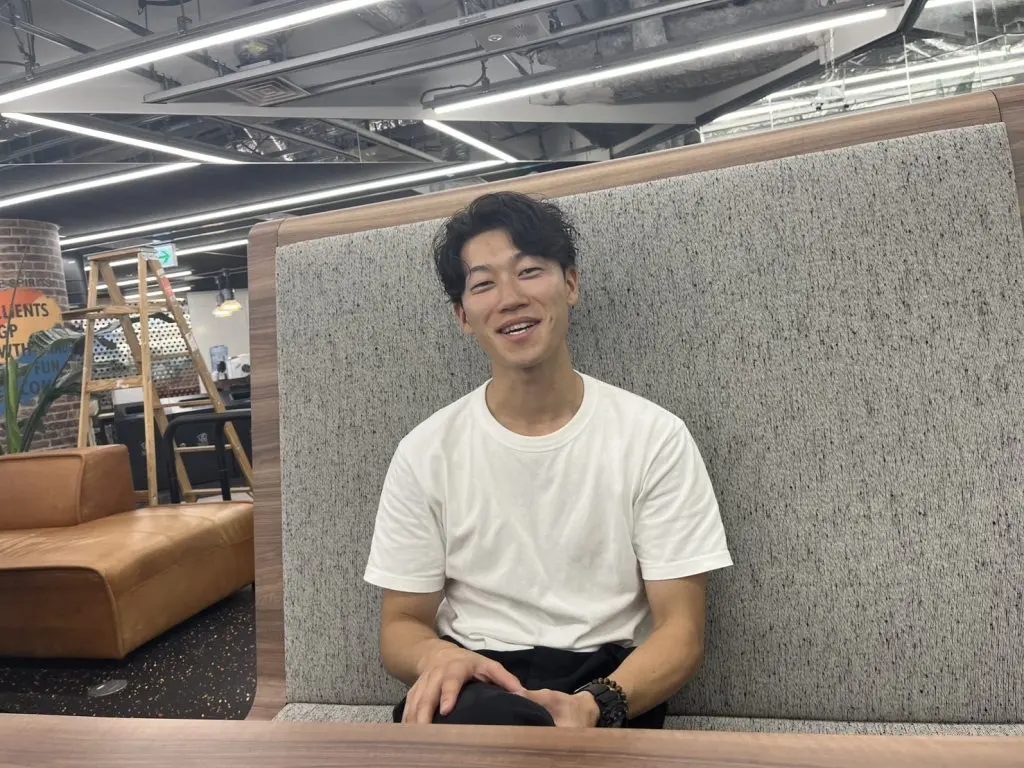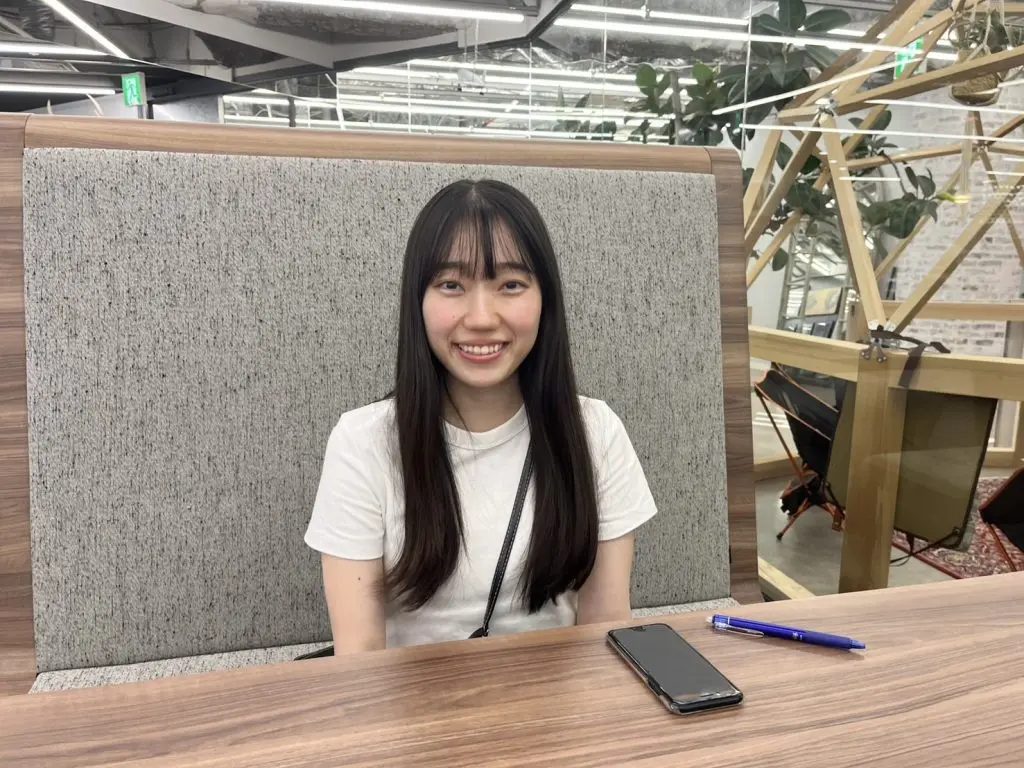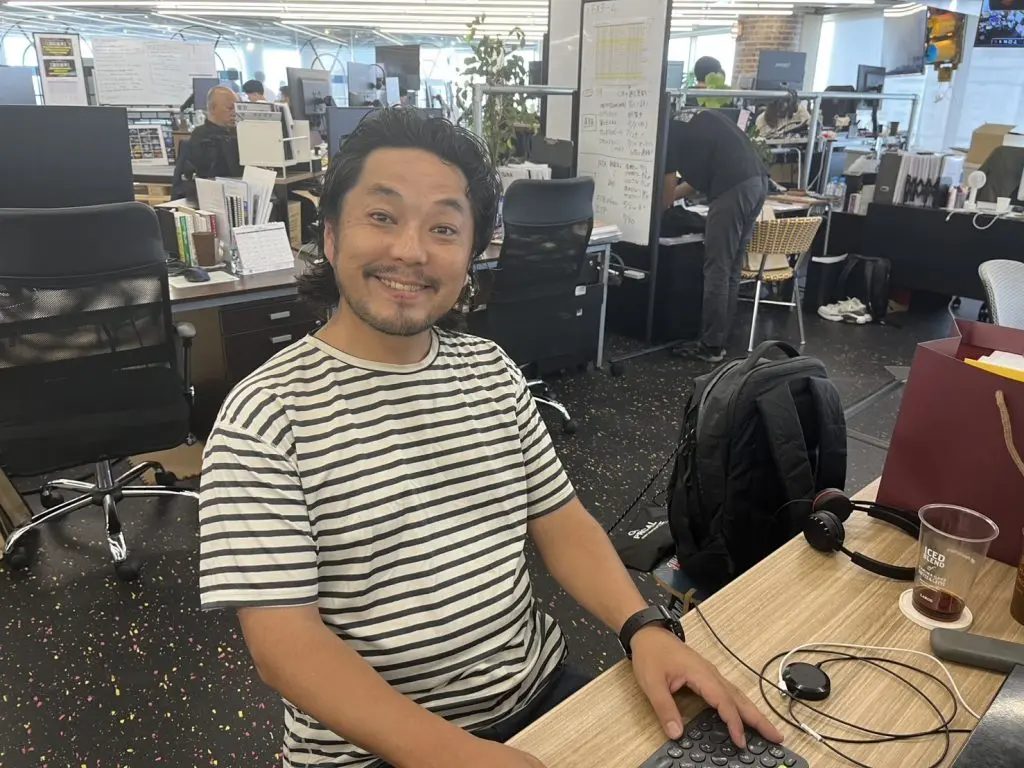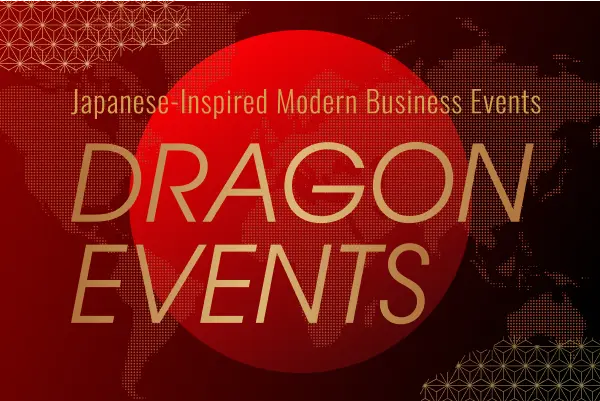Why Can You Speak English?—The English Stories of GP Members—
Hello everyone! This is Maeda from GP!
Lately, I’ve been hearing more and more English conversations around the office—and for good reason. At GLOBAL PRODUCE, international projects such as overseas events and incentive tours for foreign clients visiting Japan have been increasing year by year.
And at the center of it all are our overseas team members, who confidently lead global projects while balancing domestic ones as well.
In this article, I interviewed several of our English-proficient members to find out:
① How did they become fluent in English?
② What have they learned by actually using English in business at GP?
If you’re curious about working on overseas events or using English in your career, I hope their stories inspire you!
Toshiki Kadono

Our first interviewee is Kadono, a first-year member. Even during casual outings with his peers, he naturally engages in conversation with foreigners—proof of his impressive English skills! So what’s the secret behind his fluency?
The Beginning: English Classes and a High-School Exchange Program
Maeda: How did you first start learning English?
Kadono: I started going to an English conversation school when I was in elementary school. I didn’t become fluent right away, but it helped me feel comfortable around foreigners and develop a sense of global communication. I kept studying through junior high, and English quickly became my favorite subject.
Maeda: So you were already used to it from a young age! Was there a particular turning point that made you fluent?
Kadono: Definitely my one-year exchange in Adelaide, Australia, during my first year of high school. It was a Tokyo-government-sponsored program—I saw the application posted at school, my teacher encouraged me to apply, and somehow I got accepted! The first few months were tough, but by the end of the year, English had become second nature to me. I even studied abroad in Australia again for a year in university.
Maeda: That’s amazing! Living abroad clearly made a big impact.
Kadono: Yes, experiencing firsthand that “the world exists beyond Japan” was a huge part of shaping who I am today.
Business English and the Vision for “DRAGON EVENTS”
Maeda: You now use English regularly at GP. Do you find business English difficult?
Kadono: The hardest part is definitely the terminology. Business conversations use completely different vocabulary than casual speech, so I have to really pay attention. But joining meetings with senior producers helps me learn professional phrasing—it’s like hands-on training.
Maeda: That’s great! What’s your current goal?
Kadono: I want to be more involved in GP’s high-quality brand events known as “DRAGON EVENTS.” I hope one day people will say, “That event? GP made it.” To make that happen, I’ll keep tackling each project one step at a time.
Maeda: Love that passion! Thanks, Kadono!
Kurumi Tsubouchi

Next up is Tsubouchi, known for her friendly personality, professionalism, and, of course, her English skills!
Studying Fashion in Canada
Maeda: How did you start speaking English?
Tsubouchi: After graduating from university, I studied abroad at a fashion college in Canada.
Maeda: Canada—and fashion? How did that come about?
Tsubouchi: I had always wanted to experience studying abroad, but the pandemic made it difficult during university. So after graduating, I decided to just go for it! Since I love fashion, I wanted to study both language and design at once.
Maeda: Did you worry about the language barrier?
Tsubouchi: Of course I prepared, but honestly, I relied on a “I’ll figure it out somehow” mindset (laughs). I went to a language school for two months first, but I still remember panicking at immigration when I couldn’t understand the officer! Still, after about eight months, English communication became totally natural.
The Challenge Beyond Language: Cultural Nuance
Maeda: What’s the hardest part of using English at GP?
Tsubouchi: Understanding cultural nuance. For example, in Japan, I can easily sense when someone’s hesitating or being indirect—but that’s much harder with people from other countries. It really reminds me how important cultural awareness is.
Maeda: Especially challenging online, right?
Tsubouchi: Exactly. Every country’s culture is different, so I’m constantly learning.
Maeda: Finally, what’s your goal as part of the global team?
Tsubouchi: I want to increase GP’s overseas fanbase! We already have many fans in Japan, so I’d love for people abroad to start saying, “GP events are amazing!”
Tomo Murakami

Lastly, I spoke with Tomo Murakami, who leads GP’s global business operations. Using English daily for international sales and partnerships, he shared his personal journey and vision for the future.
Growing Up in Boston and Building Identity
Maeda: How did you first come into contact with English?
Tomo: My father’s job took our family to Boston when I was five, and we lived there for five years. Because I was so young, I adapted quickly to the language and local culture. I naturally became the “front-man” who spoke for the family in English.
Maeda: That must’ve been a formative experience. Was it hard to balance English and Japanese?
Tomo: It was! I started losing my Japanese (laughs). So at home, we made a rule to speak Japanese, and I went to a local school on weekdays and a Japanese school on Saturdays. I still remember the frustration of not being able to ask for a shovel in the sandbox—that probably fueled my desire to master English!
Maeda: What happened after returning to Japan?
Tomo: My Japanese caught up quickly, but the American mindset and experiences stayed with me. I made sure to keep English alive—talking to my sister in English or joining summer schools.
Maeda: You really valued those years.
Tomo: Absolutely. Playing in the snow, catching frogs by the pond, making local friends—it was such a rich and fun childhood.
Expressing GP’s “Cool Factor” in English
Maeda: You’ve worked in English-speaking environments before GP, right?
Tomo: Yes, but I use English far more now than ever. Aside from talking to our internal team, nearly all my external communication is in English.
Maeda: Is there anything particularly challenging?
Tomo: Conveying GP’s style and message overseas. When I joined, there weren’t many English materials yet, so I had to create them from scratch. But direct translations didn’t capture our tone—so copywriting in English was a real challenge.
Maeda: Those beautiful English materials we have now are thanks to you! What’s next?
Tomo: I want to increase our global project ratio and build an environment where English-speaking members can thrive. With more bilingual producers joining every year, I’m excited to strengthen both our language and event-production skills to take on even more global opportunities.
In Summary
After talking to these three members, I realized that there’s no single path to learning English—or to using it meaningfully.
Each of their experiences—childhood abroad, study programs, bold decisions—gave depth and personality to the way they communicate.
Personally, I used to think English was intimidating. But hearing their stories reminded me that progress comes from small, steady steps and finding your own way to connect with the language.
Inspired by their journeys, I want to keep learning too—so I can use English not just as a skill, but as a true tool for connection and creativity.
SUPERVISED BY

A collective of event production professionals handling the planning, production, and management of over 250 events annually.
From internal gatherings like shareholders' meetings, anniversaries, and award ceremonies to external PR events and exhibitions, we design and deliver optimal communication solutions. Whether in-person, online, or hybrid, we give form to the messages companies wish to convey.




